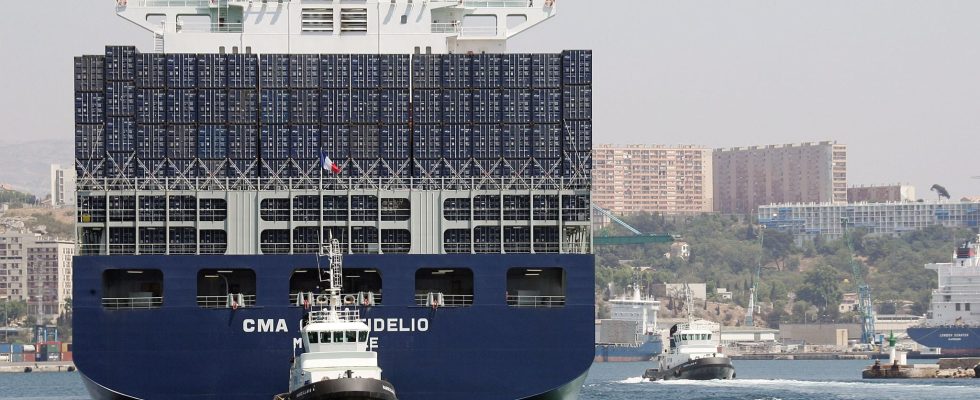Slowdown in global trade, overcapacity, significant drop in freight rates: maritime transport giants are experiencing a significant decline in their profits. Friday November 10, the French shipowner CMA-CGM published its financial results for the third quarter of 2023 : 388 million dollars, or 18 times less than in 2022. “The normalization of our sector [NDLR : du transport et de la logistique] continues in the third quarter, with a return to market conditions that we knew before the pandemic,” commented CEO Rodolphe Saadé in a press release.
The group is experiencing a significant drop in turnover from its maritime activities: $7.6 billion, or 51.8% less than the same period last year. And he is not the only one: the results of other giants in the sector, published in recent days, have highlighted a brutal return to earth after the superprofits of the Covid years. The Danish group Maersk, the world’s second largest company, saw its profit divided by 17 in the third quarter compared to 2022. And it announced the loss of 3,500 jobs in 2024.
Fall in global consumption
This meltdown in revenues of maritime transport giants is largely linked to the collapse of freight rates between March and December 2022, until they returned to their levels before the health crisis. They soared with the Covid-19 pandemic and the explosion in demand for medical equipment, but also for consumer goods, while health restrictions across the world had pushed households to redirect their spending towards equipment. , furniture and other material goods due to lack of spending on trips and outings. “The slowdown in the global economy should continue to weigh on our industry in the coming period, but transported volumes remain solid,” said Rodolphe Saadé.
Transporting a standard 40-foot container by boat now only costs $1,216, according to the Freightos Baltic Index, compared to $11,109 in September 2021. Several maritime routes are barely breaking even. Like the transpacific flow – between Asia and North America – which is the “main global flow of container ships”, according to Arthur Barillas de Thé, general manager of the transport agent Ovrsea. “It’s the flow that rose the highest during Covid and it’s also the one that collapsed the fastest,” he explains to AFP. Even the transatlantic flow, traditionally more profitable, has declined significantly.
Overcapacity
Global economic indicators do not give cause for optimism. “Consumer spending is likely to stagnate in an environment of higher interest rates” in the world’s major economies, underlines Jonathan Roach, analyst specializing in container transport for Braemar. The CEO of CMA-CGM said on Friday he expected sluggish growth in global trade throughout 2024.
Another consequence linked to the decline in international trade: fleets in overcapacity. Thanks to the phenomenal profits reaped in 2021 and 2022, major companies have indeed invested in hundreds of new ships. Vincent Clerc, managing director of AP Møller-Maersk, expressed concern “that a bad situation is being made worse by the large number of ships ordered by competitors during the boom years and which should be delivered this year and in 2024,” he told Financial Times.
For its part, Braemar forecasts average annual growth of the fleet of around 5% to 5.5% between 2023 and 2027. The excess supply of vessels should then reach 20% compared to 2020. This is not a question of this is a crisis, insists to AFP Niels Rasmussen, chief analyst for Bimco, the main global association of maritime carriers. In 2008, before the financial crisis, the order book for new ships was equivalent to 60% of the world’s in-service fleet. “Today, it is 27%,” he specifies.
“The frenzy of shipowners to buy new ships in times of prosperity, only to see them arrive in times of lean times, is a story as old as the shipping industry itself,” puts Daniel Richards, analyst, into perspective. from MSI. Large companies are also “much healthier financially because they have benefited from the very strong profits” of the Covid years and have diversified into logistics in particular, notes Camille Egloff, maritime transport specialist at the Boston Consulting Group.
